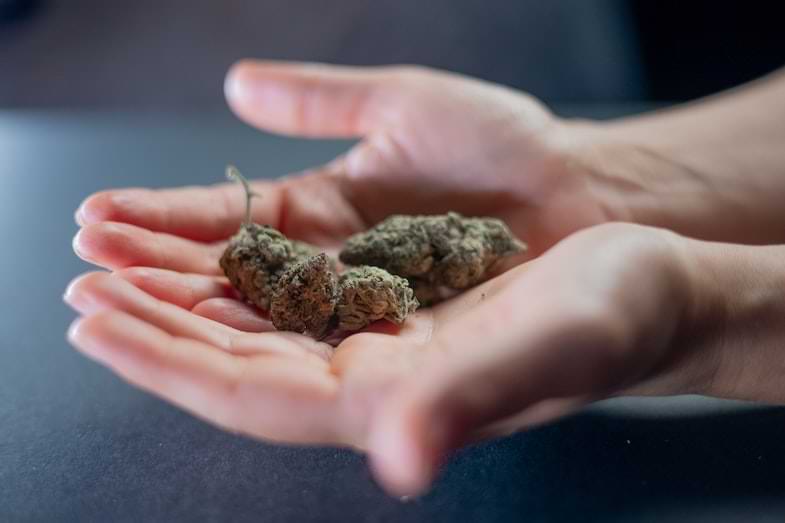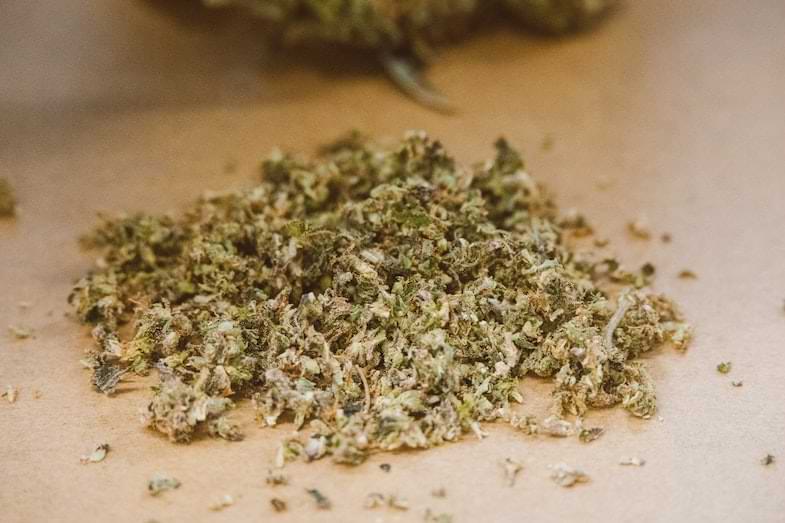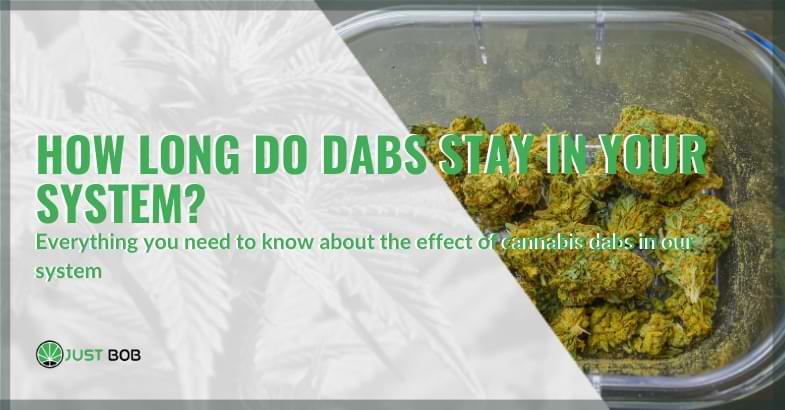Modified on: 19/10/2023
Everything you need to know about the effect of cannabis dabs in our system
For those interested in the risks of cannabis consumption, dabbing has become a growing trend in recent years.
However, there are some important concerns regarding the THC concentration in dabs and the health risks associated with their inappropriate consumption.
In this article, we will explore the risks of cannabis dabbing and the effect of THC in the body system, providing valuable information for those seeking to better understand this aspect of cannabis consumption.
We will begin with an overview of the concept of dabbing and what makes it potentially dangerous – especially if marijuana is purchased from unauthorised retailers – before examining the effect of THC in the body and how long it can remain in the body system.


First of all, what is dabbing?
The worrying thing about the concentrate, which appears to be sticky-looking candle wax, is its high dose of the psychoactive ingredient in marijuana known as THC.
Most dabs are composed of hash oil, butane oil, or created through the use of a petrochemical solvent. These dabbing cannabis concentrates can go by different types of names: BHO, shatter, budder, waxy crumble, and more.
Their appearance changes according to consistency and colour, which can be amber-yellow like honey or lighter like oil, and their consistency varies from a hard, glass-like substance that can literally break, to a spreadable consistency.
Making a residue-free cannabis concentrate is a complicated process that requires experience handling chemicals such as alcohol, propane, ethanol or butane. The main problem is that many users often try to generate the product autonomously with internet video tutorials, which usually leads to contaminated dabbing that is highly toxic to health.
This is why it is essential to purchase these products exclusively from authorised dealers, such as Justbob.
But let’s dig deeper.
Effects of dabbing
When a person inhales a dose of concentrate through dabbing, the physical and mental effects that occur when smoking marijuana are intensified. If too large a dose is inhaled, the danger of overdose would be the main risk.
The results or effects of dabbing are:
- Psychosis
- Panic attacks
- Tachycardia
- Fainting
No wonder that dabs are four times more powerful than a joint of marijuana and their effect is delivered in one hit.
Special care should be taken because burning marijuana concentrate or heating it too much can release carcinogens and compounds harmful to the respiratory tract.
But there’s more.
Another risk of dabbing is the handling of the dabs. To dose them, special tools known as dabbers are needed to cut a dab and place it in a device similar to a bong, but it has a nail that is heated.
Read also: The best foods to eat when high? Here’s the answer
How long do the dab last in the system?
Metabolism, regularity of consumption, quantity of intake, weight, and height determine the duration of the psychoactive substance in the body.
When the habitual cannabis user becomes aware of the effects that consumption has on their family, social and personal life, it is when they make the decision to begin a process of recovery, which is why it is important to consider therapeutic accompaniment that allows them to guide their decisions in their process of change.
But let’s go straight to the point: the common question people ask is how long does it take for the body to detoxify from cannabis, or popularly marijuana?
THC, which is the addictive (psychoactive) substance in cannabis, is metabolised by the liver and its metabolites are broken down over days, weeks, and even months until there are no traces left.
However, these can vary depending on the type of cannabis, but also according to:
- The concentration of THC
- The user’s diet
- The gender – since all organisms are different
- The molecular components of cannabis, which are very dynamic
Organisations such as the American Addiction Centers in Tennessee and the National Institute on Drug Abuse (NIDA) in the United States agree that the length of time THC remains in the body varies, and these centres warn that cannabis detoxification is variable.
Other factors for THC to remain in the body for longer or shorter periods of time vary according to the condition of each individual, such as:
- Metabolism
- Amount of use
- Time between use
- Physical activity or sedentary lifestyle
- Weight
- Height
- Regularity of use
It is important to take these aspects into consideration when there is active use of psychoactive substances in order to prevent traffic accidents, especially when they involve the use of agricultural and industrial machinery, which could even put third parties at risk.
Moreover, according to the NIDA, “detectable amounts of THC can remain in the body for days or even weeks after consumption, the visible effects of smoking marijuana usually last between one and three hours; those of consuming food or drinks containing marijuana can last for many hours”.


Evidence of THC in urine, blood, and saliva
As we previously said in this article, THC, known as Tetrahydrocannabinol, is the most consumed psychoactive component to achieve moments of leisure and entertainment.
It is the constituent of cannabis a product that is available in specialised shops such as the grow shop Justbob. Consumers are people who lead a normal life and who inform themselves about the effects and consequences of this substance.
One of the questions asked is how long THC lasts in the body, and the answer is multifaceted, as the dilution period varies depending on the part of the body.
These are the evidences when taking a urinary test:
- One-time use: 2-7 days
- Occasional use: 7-20 days
- Regular use: 2-7 day
- Regular use: 7-18 days
These are the evidences of THC in blood instead:
- One-time use: 1-2 days
- Occasional use: 1-3 days
- Regular use: 7 -18 days
- Regular use: 30-100 days
While these are the evidences of THC in saliva:
- Use once: 24 hours
- Occasional use: 24 hours
- Regular use: Up to 3 days
- Regular use: Up to 7 days
But there’s more.
The hair is the area where traces of cannabis remain for the longest number of days, up to ninety in the most accurate detections. This is a much longer period than the effect generated by the drug consumed.
A similar situation occurs in urine, although here the time difference is quite large and depends on the amount ingested. As you may have seen, THC can remain in urine for three days to a month. On the other hand, other drugs, like alcohol, reduce this time to less than a week.
Blood tests are most often used to detect early cases of marijuana use, as marijuana remains in red blood cells for 36 hours.
And what about the effect of cannabis in the system?
The direct, medium- and long-term effects of Cannabis are another major issue for users.
This incidence varies depending on the part of the body, with the brain and urine being the most affected. The inability to dissolve in water means that THC can only be ingested through ingestion or inhalation, so the impact on the brain is high.
The first symptoms are hallucinations and delusions, the intensity of which varies according to the amount ingested, the physical and psychological characteristics of the user and the state of the organism at that precise moment.
Furthermore, the personality of the person is a determining factor in determining the direct consequences of this drug on the brain. In this sense, people suffering from anxiety or stress outbreaks may suffer more negative consequences, as the assimilation of the drug is very different from that of a user who is stable.
Urinary function, referring to the common action of peeing, is also affected and influenced by marijuana use. These effects can be positive, as the drug facilitates the emptying of the bladder and is seen as a solution to certain urinary problems.
Read also: Buds, stems, leaves? What else can you smoke besides marijuana buds?
Conclusions
This article discussed the risks associated with dabbing cannabis concentrates, which are highly potent and can cause intensified physical and mental effects, including psychosis, panic attacks, tachycardia, and fainting.
Making cannabis concentrate is a complicated process that requires experience and handling chemicals, and dabbing often leads to contaminated products that are highly toxic to health.
The article also covered how long THC, the psychoactive ingredient in cannabis, stays in the body and its effects on different parts of the body. The duration of THC in the body depends on various factors such as metabolism, diet, gender, and the amount and frequency of use. Finally, the article also highlighted the importance of considering therapeutic accompaniment for those who are trying to quit cannabis and hashish use.
In any case, if you are a cannabis consumer and are looking for quality products that are fully compliant with the law and health, visit Justbob, the industry’s leading e-commerce, where you can buy legal products, such as CBD oil.
Takeaways about the cannabis dabs
- Dabbing has become a growing trend in recent years for those interested in the risks of cannabis consumption. However, there are major concerns regarding the THC concentration in dabs and the health risks associated with their inappropriate consumption.
- Dabs are four times more potent than a marijuana joint and their effect is released in a single hit, so caution is needed when using them.
- The duration of the psychoactive substance THC in the human body system varies depending on several factors such as metabolism, diet, gender, amount and frequency of consumption, weight and height.
- It is important to consider therapeutic support for those seeking to stop using cannabis, as the detoxification process varies according to each individual’s condition.
- The production of cannabis concentrates is a complicated process that requires expertise and the handling of dangerous chemicals, so products obtained from unauthorised sources can be highly toxic to health.
- Effects of dabbing include psychosis, panic attacks, tachycardia and fainting, and burning the concentrate can release substances harmful to the respiratory tract.
- THC can remain in the body for days, weeks or even months, but its duration varies depending on THC concentration, diet, gender, metabolism, amount and frequency of consumption, weight and height.
- THC can be detected in different types of tests such as urine, blood and saliva tests, and THC can remain in the system for different amounts of time depending on the type of test.
- Cannabis consumption can have short-term and long-term effects on the body, with the effects varying depending on which part of the body is affected. It is important to consider these effects when consuming psychoactive substances to prevent traffic accidents and other risks.
- Cannabis detoxification may vary according to individual conditions, so it is important to consider therapeutic support for those seeking to stop consuming cannabis.
- If you decide to consume legal cannabis, remember to rely only on authorised retailers such as Justbob, the industry’s leading e-commerce provider of the highest quality light marijuana.
FAQ about the cannabis dabs
What is dabbing?
Dabbing is a method of consuming cannabis concentrates, which can have high levels of THC. These concentrates can be made using different solvents, and they come in various forms, such as hash oil, butane oil, shatter, budder, and wax.
What are the effects of dabbing?
Dabbing can intensify the physical and mental effects of smoking marijuana, including psychosis, panic attacks, tachycardia, and fainting. Overdose is also a risk if too much is inhaled. Heating or burning cannabis concentrate can release harmful compounds. Burning it too much can release carcinogens, too.
How long do dabs last in the system?
The duration of THC in the body varies based on factors like concentration, diet, gender, metabolism, amount of use, time between use, physical activity, weight, height, and regularity of use. THC can remain detectable in urine, blood, saliva, and hair for varying lengths of time. For instance, one-time use can remain detectable in urine for 2-7 days, occasional use for 7-20 days, and regular use for 2-7 days or 7-18 days, depending on the case.









